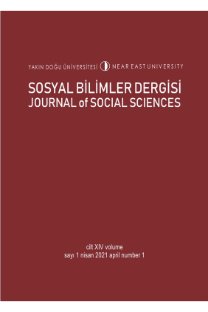The perception of relialty and its effects on the behavioıral change in the context of public relations
Halkla İlişkilerin amacı, iletişim yönetimi bağlamında insan düşünce ve davranışını etkilemektir. Düşünce ve davranışların etkilenmesi ise gerçeğin nasıl algılandığına bağlıdır. Bu çalışmanın amacı hedef kitlenin etkilenme sürecindeki yapı ve özellikleri konusunu tanımak ve ortaya çıkarmaktır. Bu bağlamda bu çalışma insanlar hedef kitleye dönük materyal hazırlama sürecinde bilgiyi nasıl manipüle ettiklerine ışık tutacaktır.
The aim of public-relations is to effect thoughts and behaviors of human in the context of communication management. That the thoughts and behaviors are effected is dependent on how the realty is perceived. The purpose of this study is to acknowledge about the structure and characteristic of the target mass in the process of the mass being effected. Therefore, it will shed a light on how people manipulate knowledge in material preparation concerning target mass.
___
Adler, Alfred, İnşam Tanıma Sanatı, çev. Kamuran Şipal, İstanbul, 2002.Aebli, Hans, Denken, Das Ordnen des Tuns, Bd. 2. Denkprozesse. Stuttgart, 1981.
Braun, Roman, NLP-Eine Einführung, Kommunikation als Führungsinstrument, New Business Line Redline Wirtschaft.2. Aktualisierte und erweiterte Auflage, Frankfurt, 2004.
Elias, Norbert, Über den Prozefi der Zivilisation, Bd. 2. Frankfurt am Main, 1993. Erdoğan, Mustafa, Dersimiz Özgürlük, İstanbul, 2003. İnceoğlu, Metin-, Tutum, Algı, İletişim, Ankara, 1993.
Koğan, Irving Smith, Public Relations, New York: Alexander Hamilton Institute, 1973.
Oktay, Mahmut, Halkla İlişkiler Mesleğinin İletişim Yöntem ve Araçları, İstanbul, Der Yayınları, 1996.
Schmidth, Siegfried J. - Zurstiege, Guido, Orientierung Kommunikationswissen-schaft, Hrg.: Burghard König,Rowhlt Taschenbuch Verlag GmbH, Hamburg, 2000.
Watzlawick, Paul, 1997: Wirklichkeitsanpassung oder angepasste 'Wirklichkeit'? Konstruktivismus und Psychotherapie. In: Foerster, Glasersfeld, Hejl, Schmidt, Watzlawick, Einführung in den Konstruktivismus, München, 1998.
- ISSN: 1986-1303
- Yayın Aralığı: Yılda 2 Sayı
- Başlangıç: 2008
- Yayıncı: Yakın Doğu Üniversitesi
Sayıdaki Diğer Makaleler
Küresel Siyaset ve çokkültürcülük
Öğrenme ve değişim ( kendini değerlendirme çalışması)
ERDAL BAY, Şerafettin KARAKAYA, Aysun YEŞİLKURT
Mediating international conflicts
The oppositions in Edward Albees' the zoo story
II. Abdülhamit'in jön Türk siyaseti: İttihat ve Terakki Cemiyeti'ne karşı önlemler
